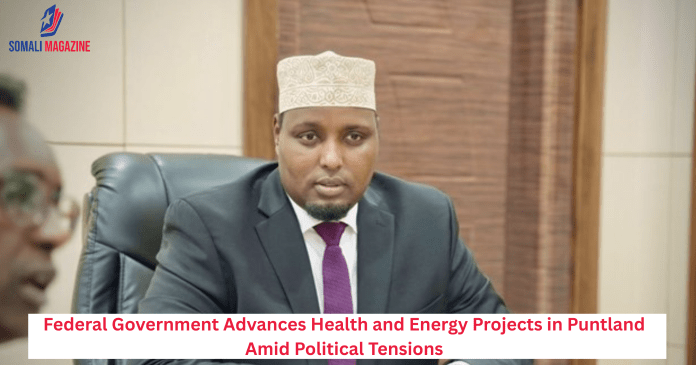Facebook Twitter (X) Instagram Somali Magazine - People's Magazine
World Bank-funded solar power plant in Garowe and hospital expansion in Bosaso mark a cautious step toward federal-state cooperation despite ongoing disputes
The Federal Government of Somalia is moving ahead with major development projects in the Puntland cities of Bosaso and Garowe, focusing on health and energy improvements. This comes even as political tensions continue between the federal government and Puntland state authorities.
Documents show that these projects are funded by the World Bank and were officially signed in Mogadishu. This highlights the continued support from international partners, who are working through Somalia’s federal institutions to deliver aid and development.
In Garowe, the Ministry of Energy and Water Resources has announced a major solar energy project. This includes building a large solar power plant to give the city more reliable and affordable electricity. Garowe, as the capital of Puntland, is expected to benefit significantly from this investment, especially in terms of access to clean energy.
Meanwhile, in Bosaso, the Federal Ministry of Health has approved an expansion of the city’s main hospital. This project is being carried out by Afrah Construction Company Limited, a firm based in Mogadishu. The company was selected by the United Nations Procurement Agency (UNPOS), which is also managing and supervising the entire construction process. Once completed, the upgraded hospital is expected to provide better healthcare services to the people of Bosaso and the surrounding region.
These developments are seen as a major shift in the relationship between the federal government and Puntland. In the past, Puntland authorities often rejected federal-led projects. For example, they previously blocked the construction of the Galkayo–Harfo road. The approval and launch of new federal projects in Bosaso and Garowe may signal a new, more cooperative approach, even if only for practical reasons.
However, local political sources in Puntland caution that tensions between Garowe and Mogadishu are still high. Some critics believe Puntland’s President, Said Abdullahi Deni, is using development projects for political gain. They argue that such projects are being used to influence public opinion or strengthen his position during political negotiations.
Despite these concerns, many observers agree that the implementation of these projects shows progress in delivering essential services like electricity and healthcare. These are areas where communities have long faced challenges.
Still, the underlying political disagreement between the federal government and Puntland’s leadership remains unresolved. This ongoing mistrust threatens the long-term success of federal-state cooperation in Somalia. While the current projects may go forward, the lack of trust and clear communication between the two sides could make future efforts more difficult.
In summary, the new health and energy projects in Bosaso and Garowe offer hope for improved services and international development support. However, political divisions continue to cast a shadow over these efforts. Real progress will depend not just on successful construction, but on building stronger, more trusting relationships between Somalia’s federal government and its regional states.

